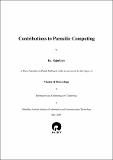Contributions to parasitic computing
Abstract
Internet is a huge connection of networks. To ensure reliable communication on the Internet a layered architecture is used, with various protocols functional at each layer. The way these protocols are used on the Internet, it is possible to exploit them to do computations covertly. This kind of computing is known as Parasitic Computing. Parasitic computing is a kind of covert exploitation in which the parasite hides the computation in standard communication protocol and sends it to target(s), who unwillingly produce the output of the hidden computation as part of the communication session.
We show that Internet checksum based parasitic computing can be used to solve three well-known problems, Discrete Fourier Transform, Matrix multiplication and Pattern matching. We describe how CRC checksum can be used to do primality testing using parasitic computing.
A more efficient implementation of Internet checksum based parasitic computing is proposed and simulated. A comparison based on false negatives with the existing implementation is given. Results show that the proposed scheme performs better in terms of the selected parameter of false negatives. However, there is additional communication overhead associated with it.
Parasitic computing can be applied in the field of security protocols. A novel sorting algorithm, Ker-sort is devised by exploiting ticket lifetimes in Kerberos and tested on Kerberos version 5.0. Run time analysis of the algorithm is given, and a comparison with existing distributed sorting algorithms is also presented. Brute-force cryptanalysis involves doing an exhaustive search in the key space. Using parasitic computing the parasite can offload the encryption or decryption operations involved in doing exhaustive search to the target(s). A theoretical cryptanalysis of SKIP and IP authentication header protocols using distributed exhaustive search is proposed.
Collections
- M Tech Dissertations [923]

